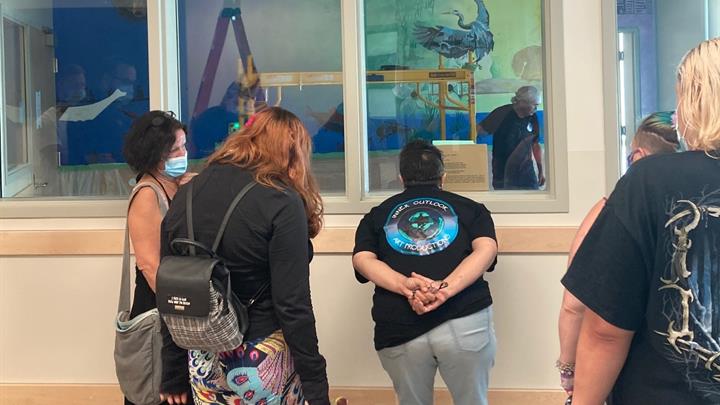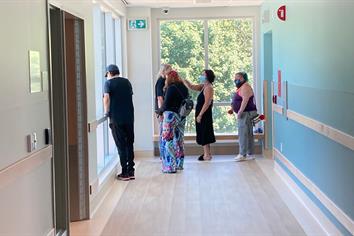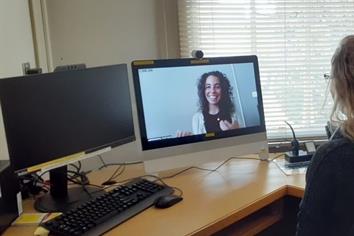The Red Fish Healing Centre for Mental Health and Addiction is the first purpose-built treatment facility in B.C. for people with complex concurrent disorders (co-occurring mental health and substance use disorders), who require specialized care.
“The benefit of the purpose-built facility is that we can design our programming first, and then build the facility around it,” says Lynn Pelletier, the vice president of BC Mental Health and Substance Use Services. “That’s what we’ve done with Red Fish. It has allowed to us apply the latest principles in design for recovery.”
“The model of care has been designed to be flexible and meet the unique needs of each individual client.”
An evidence-based care model, which defines the way all health services are delivered, informed every element of the facility’s design, and works with the space to foster healing and recovery.
“At Red Fish, we’re treating the mental illness, the substance use, and the psychosocial aspects that can get in the way of a successful recovery,” says Kathryn Embacher, the senior director of patient care services for complex concurrent disorders at BC Mental Health and Substance Use Services. “The model of care has been designed to be flexible and meet the unique needs of each individual client.”
Many of our clients have experienced trauma, which affects their mental health and addiction challenges. Treatment at the centre is based on current, trauma-informed practices to ensure people feel safe and comfortable at all times. These practices take into account everything from the type of furniture selected (for safety, but also to avoid an institutional feel) to the types of therapeutic programs offered.
 Clients and members of the partners in care committee taking a peek at the Hummingbird Room, which will soon be home to healing ceremonies like smudging.
Clients and members of the partners in care committee taking a peek at the Hummingbird Room, which will soon be home to healing ceremonies like smudging.
Within the care model, clients and their loved ones play a vital role in their own care.
“At Red Fish, we treat clients as experts in their own journeys and we work with clients and their loved ones to develop a care plan to suit their specific needs. We know clients do better when they are involved in their care,” says Embacher.
Clients at Red Fish will receive care from an interdisciplinary care team that includes nurses, psychiatrists, psychologists, dietitians, social workers, recreation and occupational therapists, as well as Indigenous and spiritual care coordinators, acupuncturists and more. These teams lead a wide range of programs and treatments in a beautifully lit healing community space.
Clients will receive care in one of three clinical pathways, depending on their primary need or disorder: A mood disorder, a psychotic disorder, or a disorder associated with substantial cognitive impairment.
 For instance, a client with a psychotic disorder may participate in cognitive behavioural therapy for psychosis, as well as groups focussing on social interactions, while a client with a mood disorder may receive medications to stabilize their mood and participate in groups to build symptom management skills.
For instance, a client with a psychotic disorder may participate in cognitive behavioural therapy for psychosis, as well as groups focussing on social interactions, while a client with a mood disorder may receive medications to stabilize their mood and participate in groups to build symptom management skills.
"Substance use and mental health disorders, as well as the related lifestyles, can impact cognitive ability. That's why cognitive remediation is a priority here."
There is also an intentional focus on clients with substantial cognitive impairment. These individuals often do not respond to concurrent disorders treatments and can now receive more specialized care in a unit designed to meet their needs.
“Right now, about 75% of our population have cognitive impairments,” says Dr. Nick Mathew, the medical director of complex mental health and substance use services. “Substance use and mental health disorders, as well as the related lifestyles, can impact cognitive ability. There is research from our own research institute that shows the prevalence of traumatic brain injury in marginalized or homeless population—many of our clients fall into this category. That’s why cognitive remediation is a priority here.”
"Clients who have been certified are extremely complex and harder to keep engaged in treatment because of the barriers they face."
Red Fish will also have a special unit for people who are certified under B.C.’s Mental Health Act, and are receiving involuntary treatment. This enhanced care unit is the only dedicated unit of its kind in B.C. and provides the highest level of concurrent disorders care in the province.
“Clients who have been certified are extremely complex and harder to keep engaged in treatment because of the barriers they face,” says Connie Coniglio, the chief operating office of BC Mental Health and Substance Use Services. “They are often homeless, have high rates of substance use, and very challenging behaviours, including violence. This unit has been designed to keep clients and staff safe, with the ultimate goal of stabilization and engagement.”
Red Fish is a provincial facility and virtual care is an important part of connecting clients to the support and services they need. Clients can attend virtual clinics with specialists around B.C. from the comfort of the centre. This is significant because, for many clients, leaving familiar surroundings and going back into the community can be challenging. Virtual care will also help clients and their care teams work with community care providers as clients plan to return home.
 “Virtual care is a catalyst for so much progress in provincial health care. We are enhancing the breadth and range of applications available through the use of tablets and technology,” says Kim Korf-Uzan, the director of e-mental health and special projects. “We are also exploring opportunities for enhanced cross-provincial education and consultation using virtual modalities, allowing Red Fish to become a ‘hub’ for access to expertise in the province.”
“Virtual care is a catalyst for so much progress in provincial health care. We are enhancing the breadth and range of applications available through the use of tablets and technology,” says Kim Korf-Uzan, the director of e-mental health and special projects. “We are also exploring opportunities for enhanced cross-provincial education and consultation using virtual modalities, allowing Red Fish to become a ‘hub’ for access to expertise in the province.”
The Red Fish Healing Centre is more than just a treatment facility. For over a decade, BC Mental Health and Substance Use Services has prioritized research, evaluation, and knowledge exchange in order to build capacity around the province. This new facility provides additional space and resources to enable further research, such as the ROAR (reducing overdose and relapse) study. Findings from these studies will inform the model of care so that treatment is based on the newest and best evidence relating to this complex population.
“We have the research, we see the trends, and we know what’s impacting people throughout the province.”
“We’re in a unique position, with access to the newest evidence, to serve the concurrent disorder population with the exact care they need,” says Embacher. “We have the research, we see the trends, and we know what’s impacting people throughout the province.”
Red Fish will have assessment rooms in each unit, which will be used for studies, and over 20 research staff. There is also dedicated space for events and conferences, such as the annual B.C. Concurrent Disorders Conference.
“With Red Fish, we’re building on our experience and authority as a research and treatment organization,” says Dr. Vijay Seethapathy, the chief medical officer of BC Mental Health and Substance Use Services. “We will continue to leverage our academic connections with leading institutes, as well as our own research institute, to further our understanding of this unique and complex patient population.”
